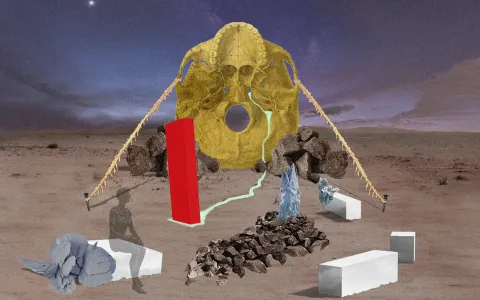Andrés Izquierdo and Pablo Ferreira
Using Ursula K. Le Guin’s idea of the “brilliant horizon”, this work presents a fantastic landscape that allows us to rethink the forces and laws that govern it. Imagining this new universe through the lens of a fictionalised reality of subversive identities, strange bodies and transhumanist monsters that blur the metamorphosis in a gradient of infinities. This is how metamorphosis is presented as a transition without beginning or end, an unravelling of different aspects, times, genres and fluids that transport the spectators to a new reality.
Crack of Dawn finds its imaginary in contemporary eco-fictions and in the most primitive science fiction, in scientific and biological phenomena but also in mysticism, religious mythology and traditional folk legends. This installation is conceived as a holistic spectacle that encompasses, deforms, blurs, merges and superimposes the parameters of what we understand as internal and external; of what we understand as corporal, spatial and objectual.
The object of this production consists of an installation that appropriates the architectural language of the amphitheatre to dismantle it and conceive it not as an impermeable space but as a dynamic ecosystem in which the stage design, audience, seats, proscenium, performer, props and all the agents involved in the production of a stage piece emulsify into a whole. Smells, sounds and fluids emerge from an installation in which the scenographic and architectural elements will be rethought in order to distance them from the experience of everyday visualisation of a play and to bring them closer to the plane of fantasy, poetry and psychodelia.
The performance art piece that will give life to the installation, produced in collaboration with the choreographer Mar Aguiló, oscillates between dualisms such as mechanical-organic, human-animal, past-future, feminine-masculine and will incorporate movements inspired by the ideas of mimesis, contortion or vibration.
Pablo Ferreira Navone (Madrid 1990) M.Arch 2016. Through his work he creatures a diffuse exercise somewhere between design, architecture and art, covering a great range of scales. As a personal introspection represented through a range of materials and techniques, he seeks a doble reading that brings out the duality that exists within the observer, provoking a debate on the origin of his own thought.
He kicked off his career by winning the competition for the remodelling of the Plaza de España in 2017 and by founding Colectivo La Cosa the same year. His work has been exhibited in New York, Madrid and Paris. In 2020 he set up the Institute of Post-natural Studies.
Andrés Izquierdo (Madrid 1993) deforms, superimposes, mutates and confronts an amalgam of fictions, myths, events, superstitions or fantasies. Bringing into conflict opposing physical and philosophical conditions such as: baroque and minimalist, fluid and static, divine and perverse, artificial and self-generated or abstract and hyperrealist. The result of his research concludes in the form of domestic objects, stage designs and architectural spaces in which spiritual and metaphysical questions posed through the perception of light and space dispute the nature of such earthly notions as faith, guilt, time or violence.
Izquierdo’s work has been exhibited in spaces such as Lava Projects (Madrid); Camp Design Gallery (Milan); Mast (New York); Dutch Design Week (Eindhoven); DMY (Berlin) or Galería 6mas1 (Madrid) and he has given lectures and held workshops in such institutions as Pratt (New York) or the Higher School of Design (Madrid).

